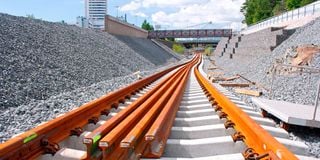
Transportation and Trade in Africa: The Lobito Corridor
Experts are currently advocating for the establishment of businesses to process the minerals along the way. The Lobito Corridor, which connects the mining regions of Angola, Zambia, and the Democratic Republic of the Congo, is expected to revolutionize African trade and transportation of vital minerals.
During the G7 Summit in Japan in May 2023, US President Joe Biden unveiled the first strategic Global Infrastructure and Investment (PGI) economic corridor, known as the Lobito Corridor, as part of the G7 Partnership for Global Infrastructure and Investment.
The project includes 260 km of major feeder roads inside the corridor and 550 km of rail running across Zambia from the Jimbe border to Chingola in the copperbelt.
After it is finished, it will widen an economic corridor that links the host nations to international markets, promoting regional growth and trade as well as advancing the goal of connected, open-access train that runs from the Atlantic to the Indian Ocean.
According to Akinwumi Adesina, Group President of the African growth Bank (AfDB), corridors are essential for Africa’s growth, and Lobito is an excellent illustration of how partners may collaborate to create effective corridors.
It is more than just a passageway for raw materials to leave. As part of the roadwork, the partnership comprising the US government, Africa Finance Corporation, and AfDB has pledged to contribute $500 million. Dr. Adesina told The EastAfrican, “We have committed our risk guarantee facilities to support how to leverage resources on that corridor.”
When discussing product transportation, we in Africa need to make greater investments in railroads. A little more money should be invested in electric rail networks if you’re hoping to decarbonize your transportation system. Rail is necessary for haulage when opening up new areas, agriculture, minerals, metals, and other heavy industries.
Through increased export opportunities and increased regional trade, the corridor will unite the continent and improve linkages with international markets.
A $250 million investment from the US Development Finance Corporation (DFC), which is presently undergoing due diligence, would help the Lobito Atlantic Railway (LAR) consortium, which is working with the AFC for advising support to upgrade and run a 1,200 km Benguela railway line across Angola.
When the agreement was inked early this year, Zambia’s President Hakainde Hichilema stated, “The Lobito Corridor will pass through a lot of assets that can help the three countries mitigate climate change when pricing capital, discrimination against Africa occurs.”
He emphasized that the initiative needed support and acceleration because it was a once-in-a-generational effort.
The LAR project is expected to result in a notable reduction in transit time, improved connectivity between the DRC’s mineral-rich regions and global markets, and a decrease in the carbon emissions associated with road freight.
It will also create new markets, such as agribusiness, by bringing down expenses for companies operating along the corridor.
Nisha Biswal, the deputy CEO of the US International Development Finance Corporation, stated, “We are committed to working with our partners on the continent to build high-quality infrastructure and invest in agriculture, healthcare, and financial services that will impact lives and livelihoods across the corridor,” while she was in Lusaka early this year for the PGI Lobito Corridor Investor Forum.
Three significant infrastructure projects in the Lobito Corridor were officially signed by the US and Angola on May 7, during the US-Africa Business Summit organized by the Corporate Council on Africa in Dallas, Texas.
In order to promote and expedite Angola’s economic investment priorities, the United States signed agreements for projects totaling more than $1.3 billion in the areas of clean power, radio connectivity, and transportation infrastructure.
The $450 million Acrow Bridge project is building 186 bridges across Angola through engineering, procurement, and construction. This is an investment in contemporary transportation infrastructure.
Standard Chartered Bank, Exim, and the Private Export Funding Corporation will all provide funding and assistance for this. In Eastern Africa, similar projects are underway, and the pan-African lender is at the forefront of securing funding for them.
The main infrastructure projects include the Tanzania-Kenya-Ethiopia project, the Tanzania-Burundi-DRC standard gauge railway, and the Arusha-Mombasa-Malindi-Lamu road.
According to Dr. Adesina, the bank is funding $696.41 million worth of projects for Tanzania and Burundi to begin Phase II of the Joint Tanzania-Burundi-DRC SGR.
“We are making investments in the $3.8 billion Central Corridor, which connects Tanzania, Burundi, and the Democratic Republic of the Congo, as well as the Dodoma airport. In addition to giving Tanzania $696 million, we are use syndication to help collect about $3.3 billion so that the corridor may be constructed.
The bank’s acceptance of $1.08 billion in loans and guarantees for Tanzania to finance the building of the regional SGR to develop the Central Corridor by encouraging large-scale mining and commercial agriculture was the most significant development of 2023.
The Bank was concentrating on building corridors to connect Tanzania and Ethiopia with Kenya.
“We are also funding the 1,000-kilometer corridor that runs from Addis Ababa to Nairobi—Mombasa. According to Dr. Adesina, just one corridor has cut down on travelers’ travel time from three days to less than twenty-four hours from Ethiopia to Nairobi. “It has contributed to a more than 400% improvement in trade between Kenya and Ethiopia.”
The development of the Bagamoyo–Tanga–Horohoro/Lunga Lunga–Malindi Road is being funded by the AfDB, the EU, and the Kenyan government. It is anticipated that the 54-kilometer project within Kenya would be finished this year. In 2021, building on it started.
Beginning at the planned New Mtwapa Bridge close to Mtwapa town, the road project in Kenya will cost Ksh7.5 billion ($50 million).
All Categories
Recent Posts
Tags
+13162306000
zoneyetu@yahoo.com



